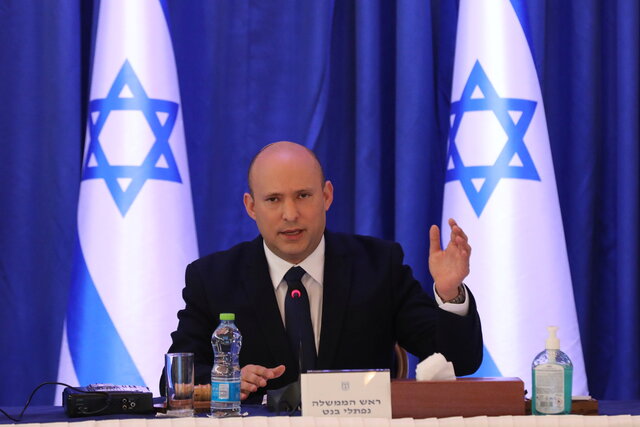Ali Abdi, in an interview with the website of the Strategic Council on Foreign Relations, stated that the latest annual report of the Zionist Center for National Security Studies for 2022 has referred to Iran and the Zionist regime’s internal turmoil as the most important challenges of the regime, noting: The atmosphere that this report depicts is somewhat similar to the situation outlined in the 2021 report, and the challenges are the same cases that were addressed last year.
Recalling that for the first time in the 2021 report, internal divisions were seen as a threat, he added: The difference between those reports is that, given the challenges after the 12-day war, concerns about bipolarity of the situation and internal challenges in the field of internal policy of the regime as well as the escalation of challenges with the 1948 Palestinians and the West Bank and Gaza, have been highlighted and discussed in detail. Of course, with the change of administration in the United States and the revival of the talks on the Joint Comprehensive Plan of Action (JCPOA), in that report more attention has been paid to Iran’s nuclear program as compared to the last year.
Abdi stressed: The sharp reactions the Arabs showed in 1948, and even in favor of the Palestinians in the West Bank entered into the conflict, were beyond the imagination of the Zionists and have created additional concern for them. At the same time, the power of the Palestinian Authority, especially after the 12-day war, has been severely challenged, and the weakness of its security apparatus in controlling the Palestinians has exacerbated the Zionist regime’s security concerns.
Internal challenges of Zionist regime being serious and fundamental
The expert on Zionist regime’s affairs continued: Although this report has tried to be very realistic, the issues are more serious and fundamental than what has been depicted in it, and the authors of this report have deliberately chosen a much softer tone while the challenges are much more serious than what is written in the document.
Pointing to the benefits of the scene of domestic politics in the Zionist regime in view of the report, which was about changing the government and removing Netanyahu, Abdi added: The management of COVID-19, the relative stability of security and improvement of economic conditions, and the project for normalization of relations with the Arabs have also been considered in this section which, of course, needs to be discussed and needs more serious consideration.
Regarding the challenges mentioned in the report, he explained: According to the report, the political coalition formed by the new government has not yet stabilized much and its fragility against the active and strong opposition group in the Knesset has been considered. In the discussion of the main internal challenges it has also emphasized that the main issue is the polarization of the Zionist society, which is considered as the product of Netanyahu’s 12 years rule.
The analyst of the Zionist regime’s affairs mentioned the low level of social resilience of the inhabitants of the occupied territories as another important challenge of the Zionist regime, which was tested during the COVID-19 epidemic, the 12-day war and also in the recent challenges with the Palestinians and they did not succeed, adding: According to the report, those issues are very fundamental challenges in that regime, which will seriously show itself in time.
Abdi cited social and economic challenges and the social gap as other threats to the Zionist regime that have been raised in the report, adding: The economic growth of 7% in 2021 has been anticipated at around 5.5% in 2022. In addition, while the ruling class in the Zionist regime not only did not suffer in COVID-19 Crisis, but also benefited more, the strata below the poverty line faced more challenges and found more acute conditions. This situation has widened the class gap in the Zionist regime, and in a society that is highly supported by the world powers and receives a lot of aid, about 28% of the people live below the poverty line.
Saying that about 36% of the children in that society live below the poverty line, he explained: Such issues indicate that the regime faces serious threats in terms of infrastructure, housing and education which, of course, are addressed in this report.
Intensification of sabotage in case of agreement in Vienna
Abdi also referred to an article in the Haaretz newspaper by a former senior Israeli intelligence and security officer in which he stressed that in the event of a nuclear deal in Vienna, a special military budget would be allocated to Mossad with an aim of carrying out some terrorist and sabotage acts, saying: Contrary to some analysis, it seems that the Zionist regime’s advantage in dealing with the Iranian nuclear issue is not a military action, but this advantage is in “covert actions” against Iran and in “dirty war”. The policy that we have witnessed in the past two decades, and with the agreement in Vienna, this war will intensify.
The expert on Zionist regime’s affairs added: In this article, in the debate over recommendations a number of issues has been addressed, including preparation for nuclear agreement or disagreement as well as for Iran to reach the nuclear threshold is necessary. In fact, in discussing practical solutions, the report addresses issues such as maintaining the freedom of regional operations and campaigns between wars and continuing to obstruct the nuclear program in coordination with the United States.










0 Comments